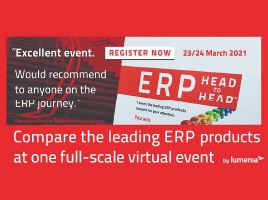Every organization wants better business metrics. Especially in manufacturing industry how you can have better reporting and enhanced revenue? and what are the benefits of ERP for manufacturers? Here is the answer of abas ERP;

For senior managers responsible for driving manufacturing growth at a strategic level, anecdotally speaking, the value of ERP should be fairly self-evident. For example, in general, everyone in this segment wants better business metrics; better reporting; and enhanced revenue – right?
However, at a practical level, hearing about these results is not the same as actually doing (or paying for) them, especially when 37% of your workforce will be using the system according to the latest ERP research – there’s a lot riding on the system being worth it to your bottom line, and to your workers. This is where glossy sales collateral and smooth-talking consultants actually become more problematic than helpful. Consequently, in an attempt to offer some ‘honest-brokerage’ relating to why ERP offers enhanced pointers to the manufacturing sector, we thought we’d showcase just three benefits of manufacturing ERP among a host of values relating to this particular business software technology.
Operational streamlining
Regardless of where you create, fabricate, and deliver products, the need for integrated operations is always intrinsic to the manufacturing sector. Using an intellectual construct originally fostered by Leonard E. Read in the early 80’s, consider an American firm delivering the most simple of all static ‘products’; the yellow #2 pencil.
In today’s scenario, the final product still typically involves interactions between a linear supply-chain spread across the planet ranging from wood delivered from the Pacific Coast of the United States, graphite from South America, and rubber materials produced from East Asia. On top of these core components, however, today’s manufacturing environments also typically harbor other, localized, dependencies known as business ‘cut-outs’ that provide further cottage-level support to each secondary pencil producer.
Assuming today’s global interest in making ‘something’ in one country, then selling that product ‘everywhere’ else in real-time, in the past this beehive of coordination required enormous amounts of intellectual, operational, and financial ‘sweat’ just to ensure that raw materials always arrived at the right places at the right time. However, with today’s ERP systems, this flurry of headaches are mitigated, and in some cases, eliminated entirely; since ERP platforms allow everyone in the production chain, whether big or small, to talk and interact with each other as necessary across a common digital playing field.
Enhanced productivity
In the same way that ERP systems offer enhanced operational values strategically, in tactical terms, enterprise productivity also experiences similar advances. For example, consider a production line in the textile sector involving a wide-range of raw fabrics, dye lots, color curing requirements, QA validations, final packaging requirements, and finally, time-sensitive distribution processes.
In the past, each of these core production steps had to be integrated and managed manually, usually involving paper-based scheduling processes that were as prone to error, as they were cumbersome to deal with on a daily basis. Today, however, a comparatively ‘simple’ ERP platform mounted in the cloud allows all of those processes, and more, to interoperate in parallel, thereby allowing the constellation of moving parts to be seen and responded to in real-time.
The upshot is that the entire process is not only quicker to manage, but less turbulent since production boggles can be dealt with upstream, well before logjams on the shop floor can impact revenue productivity downstream.
Information security
This last upside may be the most critical of all ERP values since today’s manufacturing processes are highly-threatened by bad actors that can drive an enterprise to its knees. As an intrinsic advantage, cloud-based ERP developers have stood at the forefront of information security, particularly in concert with multi-channel network providers such as AWS and others. This means that regardless of the level of business ‘threat’, frangible nature, and/or density of your information, someone will always be ‘there’ to ensure that your operations are secure.
So, there you go; three ERP upsides in the manufacturing segment. Clearly, there are many more, but then, as a senior manager there’s always going to be something new to learn whether you like it or not – right?
ERP Pricing: Get 2019 pricing on 45 different ERP systems. Click to download your free guide.





